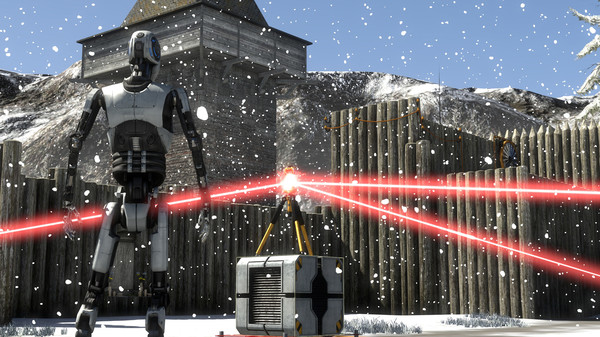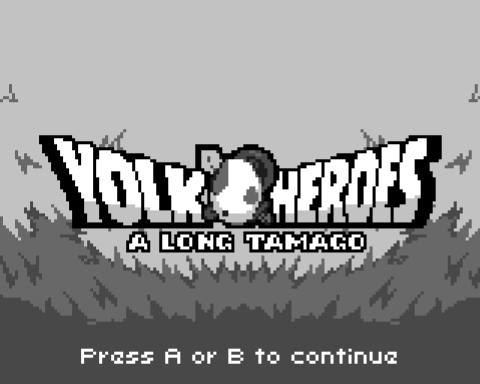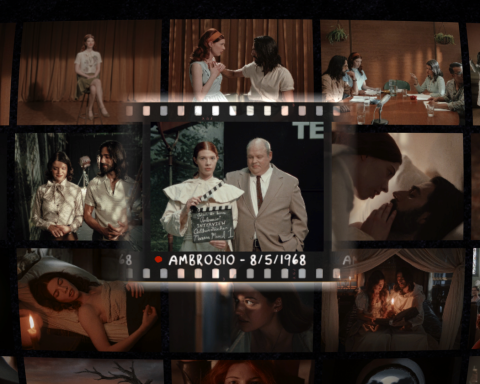With over 100 different puzzles nested into the beautiful yet often lonely world of The Talos Principle, it would be easy to believe that these challenges are what you will spend most of your time thinking about. Truth be told, there is an additional layer on top of the game that poses a series of philosophical questions as well. The combination of mind bending questions blends wonderfully with challenging puzzles to create a memorable and unique experience.
Things start simply enough. You awaken. You look around. Then the disembodied booming voice of an entity called Elohim trails a few loose narrative threads for you to think about. Like the game’s puzzle mechanics, these brief words leave you with more questions than answers but also a certain amount of direction.
The way The Talos Principle begins could in and of itself make for a fascinating study in teaching game mechanics. Instead of beating you over the head with lengthy exposition or tutorials that hold your hand through the first forty minutes of gameplay, The Talos Principle opts to teach through hands-on experience. Just like both Portal games did (I can promise you it won’t be the only time you sit back and think to yourself “this is very Portal-like). The initial puzzles are incredibly simple, but they are also effective teaching tools without coming across as such. They are organic, logical and they help to develop the fundamental understandings the player will need in order to be successful.
All good puzzle-based games really need to function like this. The first player perspective, science fiction setting and puzzle mechanics will no doubt draw many more comparisons to Portal. Those are some lofty comparisons to be sure, but they are fair and well earned. While The Talos Principle lacks a singular clever mechanic such as the gun from Portal or the box manipulations from Q.U.B.E., it compensates by offering greater variety. Not looking to be constrained to a type of puzzle, The Talos Principle will slowly roll out a large number of challenges that slowly require more tools and a full understanding of what you have done to reach this point in the game. The puzzle mechanics are carefully layered, unlocking new areas or tools along the way while continually teaching you how to play the game.
This all makes for a satisfying gaming experience, especially when mixed with simple but effective music and visuals. The world is a lonely place with a post apocalyptic feel to it. On the one hand, technology abounds. On the other, the world is lonely and lacking in life. The voice of Elohim speaks to you now and again, and there are parts of the stage where you get to interact with terminals and grasp at more of the loose narrative threads as the story slowly gets woven together. However, the lovely location also looks like a slice of real estate that the rest of the world has either forgotten about or never truly known. These lingering remnants of what you can only assume is the past left a footprint on the surroundings without leaving any tangible people to actually interact with.
These haunting moments bring about The Talos Principle’s more philosophical moments. You are tasked with completing challenges and answering questions. These answers are generally chosen form a list, so they are not truly your words, but they are different enough from one another to offer some distinctively unique results. Your choices along the way help to define who and what you are. Why are you pressing forward? Because of what a disembodied voice has said? Because the challenges are there in front of you? Because you are trying to prove… what, precisely? Who and what you are? Why you are?
The Talos Principle had a knack for staying with me even when I was not playing the game. Quite often I was doing something else, yet in the back of my mind I was trying to figure out that last puzzle I could not solve. Quite often I was at the same time trying to figure out where the story was taking me as well. Even the names of the environmental challenges give you an idea of what it will take to complete the task in front of you, leading to an organic experience where the puzzles and their existence makes sense.
As far as the gameplay goes, The Talos Principle is really looking to challenge your mind more than your reflexes. I don’t mean to beat the Portal comparison to death, but the two games while puzzlers also feel fundamentally quite different in execution as well. Portal is much more about reflexes and even platforming. The Talos Principle has some puzzles that are indeed timing based, but they never quite reached the level of dexterous challenge that Portal did. Instead The Talos Principle challenged me to approach the puzzles from different perspectives.
The design of the world is a fairly open one. Instead of having to chart a path from one room to another until you meet your next challenge, The Talos Principle offers considerable flexibility. It wants you to explore, and in the process you learn more about the world. This in turn teaches you more about how to approach puzzles while dangling more narrative threads in front of you. If a puzzle is proving too difficult, there is the option to move onto another in a different location. I never once ran into a situation where all of the various different puzzles had me stumped at the same time. In fact, I quite often found myself abandoning one challenge to consider another. While the two puzzles had nothing to do with one another, I would frequently figure out the solution to the previously stumping puzzle while solving a completely different one. It is a rewarding experience when those challenges come together.
Few games have everything working in such synchronised harmony as The Talos Principle. The world, puzzles, narrative and music are all served to the player in small helpings, never overwhelming and allowing you to soak in and become one with the world. By the end of the game, it has challenged your mind in multiple ways. As a game The Talos Principle forces the player to reason through the mechanics of its puzzles, all the while tickling the philosophical parts of our minds with deeper questions.
– Nick H.
US Editor











